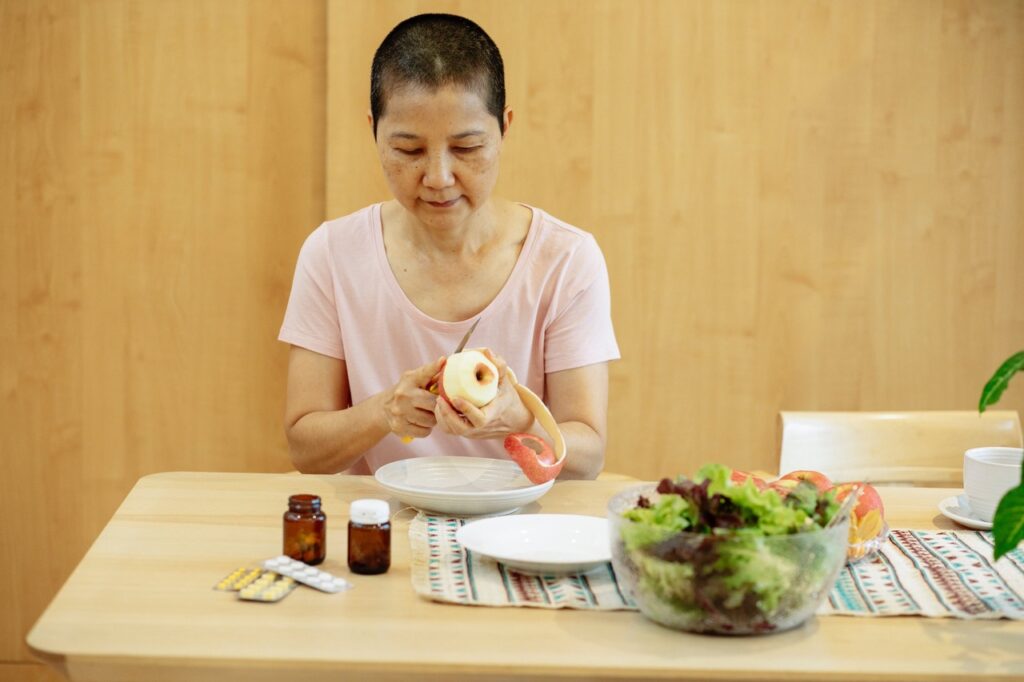No products in the cart.
Health Conditions, What to Eat and Drink
What Foods to Eat When Dealing With Liver Cancer
Liver cancer is a difficult disease that necessitates extensive therapy and care. Nutrition, in addition to medical therapies, plays an important part in supporting the body’s healing process and overall well-being. Before, during, and after treatment, a healthy and balanced diet can help reduce symptoms, maintain strength, and encourage healing.
Understanding Liver Cancer Nutrition Guidelines
It is critical to prioritize frequent meals and snacks throughout the day when coping with liver cancer. Consuming five or six small meals, three hours apart, ensures a consistent influx of nutrients, proteins, and calories. This method lowers the chance of treatment-related adverse effects like nausea.
Focus on including lean proteins in your diet to strengthen your immune system and promote recovery. Protein-rich foods include chicken, turkey, fish, eggs, low-fat dairy products, nuts, and soy. Oatmeal, whole wheat bread, brown rice, and whole grain pasta are examples of whole grains that supply vital carbohydrates and fiber for higher energy levels.
Colorful fruits and vegetables should also be part of your daily diet. These colorful foods are high in antioxidants, which help the body fight cancer. Incorporating healthy fats from sources such as avocados, nuts, seeds, and olive oil can also improve nutrient absorption and deliver antioxidants.
Hydration is essential during liver cancer therapy, so drink plenty of water and other fluids to stay hydrated. While it is critical to focus on nutritional options, it is also critical to restrict your intake of sweets and foods high in added sugars. These have little nutritional value and may displace healthier ones.
It’s crucial to remember that every liver cancer experience is different, and particular circumstances may necessitate changes to these broad rules. Consult your oncologist and a trained dietician for individualized advice and assistance that is suited to your specific needs.

Diet and Nutrition for Living with Liver Cancer
Living with liver cancer has unique obstacles that can have an impact on your body’s dietary requirements. The symptoms of liver cancer, as well as the side effects of certain treatments, can have an impact on your appetite and energy levels, making it critical to eat well before, during, and after treatment.
The Role of the Liver and Digestive System
The liver is essential to the digestive system. It secretes bile, a fluid important for breaking down fats during digestion, and is located slightly below the ribs on the right side of the belly. Any disease or therapy that affects the liver can interfere with digestion.
Tips for Maintaining Good Nutrition During Treatment
Maintaining a healthy diet during liver cancer treatment is critical for minimizing side effects, hastening recovery, and boosting the immune system. Here are some pointers to get you started:
Eat six to eight smaller meals or snacks throughout the day instead of three major meals. This method ensures a consistent intake of nutrients and may aid with nausea.
Consult a dietician, if you’re having trouble eating or staying at a healthy weight, get advice from a trained dietitian. They can provide you with personalized advice on how to deal with eating disorders, weight issues, and muscle loss.
Light physical activity, such as walking, can help to improve appetite and digestion, reduce fatigue, and improve general well-being.
Maintain proper hydration by drinking drinks throughout the day. If simple water isn’t appetizing, consider flavored beverages or soups with added calories.
Consider nutritional supplements, if you are unable to consume enough food, talk to your doctor, palliative care expert, or nutritionist about introducing nutritional supplements into your diet.

Diet and Nutrition Changes with Liver Cancer
Liver cancer and its therapies can have a substantial impact on your body’s functioning. It is critical to manage these changes for your nutritional health, recuperation, and overall well-being. Treatment side effects can vary, but here are some coping strategies:
Fatigue
Fatigue is a typical complication of liver cancer treatment and can be induced by a low red blood cell count (anemia). Consider the following suggestions for dealing with fatigue:
- When you have more energy, plan and prepare meals ahead of time.
- To save electricity, shop for food online.
- Accept shopping and cooking assistance from family and friends.
- Regular light exercise, such as brief walks, can help to improve appetite and mood.
- Keep snacks on hand for short energy boosts.
Loss of Appetite
Loss of appetite can be caused by both liver cancer and its therapy. Try the following to whet your appetite:
- Every 2-3 hours, eat small, frequent meals or snacks.
- To avoid feeling overwhelmed by enormous servings, use a smaller dish.
- Choose foods that appeal to you, even if they stray from standard meal options.
- To achieve a balanced nutritional intake, include a range of foods in your diet.
- To increase your fluid intake, sip on calorie-rich liquids or soups.
Changes in Taste and Smell
Chemotherapy and other treatments can alter the taste and fragrance of food. Consider the following techniques to deal with these changes:
- Herbs, spices, and condiments can be used to enhance the flavor of food.
- Experiment with different foods to find ones that are more enticing to you.
- If you dislike the flavor of meat, consider cheese, eggs, or plant-based alternatives.
- To avoid areas of the tongue impacted by taste alterations, use a straw.
- To reduce harsh scents, eat cold or room-temperature foods.

Nausea and Vomiting
Cancer treatment frequently causes nausea and vomiting. Try the following to alleviate these symptoms:
- Before treatment, eat a little snack and then wait a few hours before eating again.
- Consume modest, regular meals throughout the day to avoid going hungry for long periods.
- Snack on dry or bland foods such as crackers, bread, or dry cereals.
- Instead of hot, oily, or spicy dishes, choose chilled or room-temperature options.
- To relieve nausea, consume ginger in various forms, such as ginger biscuits, tea, or pills.
- Take anti-nausea drugs as directed by your physician.
Dry Mouth and Ulcers
Certain medications might induce dry lips and oral ulcers, making eating difficult. To relieve pain, try the following suggestions:
- To soothe the mouth, suck on ice cubes or use mouth rinses.
- Soups, stews, and smoothies are examples of soft, easy-to-eat cuisine.
- To avoid inflammation, choose cold or room-temperature foods and fluids.
- To make dishes easier to swallow, moisten them with sauces, gravies, or creams.
- Drink fluids with meals and throughout the day to stay hydrated.
Diarrhea
Liver cancer and its therapies can cause bowel disruption and diarrhea. Here are some suggestions for dealing with this symptom:
- Reduce the strain on your digestive system by eating smaller, more frequent meals.
- Avoid foods that can aggravate diarrhea, such as spicy or oily foods.
- Choose items that are easy to digest, such as rice, toast, or yogurt.
- Drink plenty of water to restore lost electrolytes and stay hydrated.

Recovering from Surgery
Surgery is frequently used as part of the treatment approach for liver cancer. Your body requires appropriate nutrition after surgery to help healing and recovery. Consider the following suggestions:
- Start eating again soon after surgery, with bland foods such as plain rice or toast.
- Take fiber pills to help with constipation, which is a typical post-surgery problem.
- If eating becomes difficult, consider taking vitamin supplements or drinking fortified liquids.
- A feeding tube may be required in some circumstances to ensure appropriate nutrition.
Remember that an adequate diet is critical for aiding healing, controlling the side effects of therapy, and enhancing the overall quality of life during your liver cancer journey. Discuss your nutritional requirements with your healthcare physician, and consider seeking personalized advice from a qualified dietitian. You can improve your health and help your body fight liver cancer by prioritizing nutrition.
Conclusion
To sum it up, making food choices when you have liver cancer means carefully thinking about foods that are good for your general health and well-being. During our research, we’ve talked a lot about how important it is to eat foods that are high in nutrients and easy to stomach so that you can stay strong and handle any side effects that may come up from your treatment.
If someone has liver cancer and wants to know what they should eat, I suggest they talk to both medical workers and nutritionists. This way of working together makes sure that the person’s food choices are in line with their health needs and treatment plans. This creates a complete plan to support health during the difficult journey of liver cancer.


